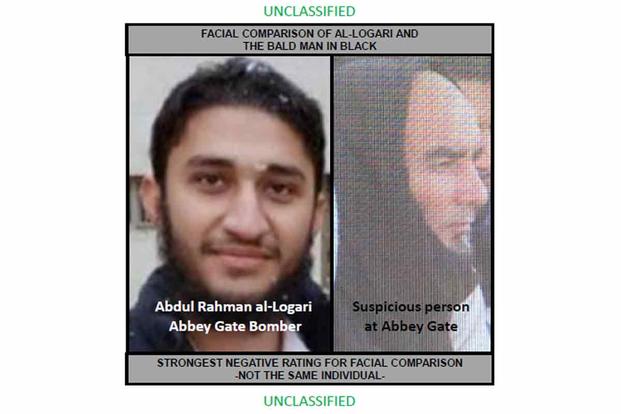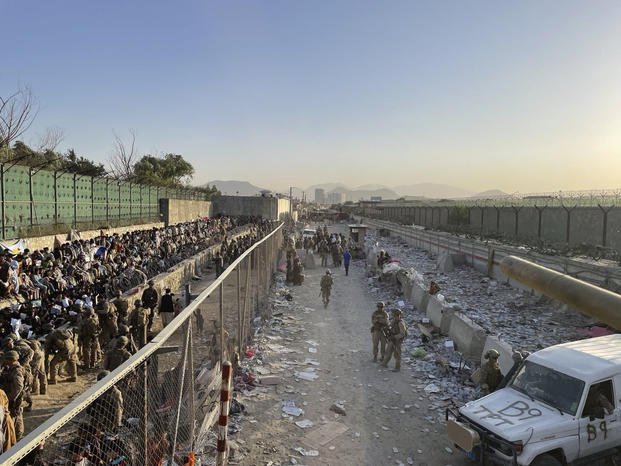An additional Pentagon review into the events surrounding the deadly bombing at Hamid Karzai International Airport in Afghanistan has determined that service members who spoke out publicly about what they felt was their ability to prevent the attack were mistaken.
The bombing, which occurred in late August 2021, targeted the large crowds of Afghans who were trying to leave the country in the last days of the American military presence and ahead of the Taliban's takeover. The attack killed 13 U.S. service members, including 11 Marines and a soldier and sailor, wounded dozens more, and killed at least 170 Afghans.
"Over the past two years, some service members have claimed that they had the bomber in their sights, and they could have prevented the attack," one of the officials who briefed reporters on Friday said. "We now know that is not correct."
Read Next: Transgender Veterans Sue to Force VA to Cover Gender-Affirmation Surgeries
Officials identified the man responsible for the bombing as ISIS-K member Abdul Rahman al-Logari. Aside from his name, military officials also confirmed that al-Logari was among several prisoners that the Taliban released in the days prior to the bombing, though one official stressed that "ISIS-K would still have been able and capable of conducting the attack" without al-Logari "because they had multiple bombers that were available."
The news comes just over a year after some of the service members who were defending the airport and responded to the bombing spoke out publicly and before Congress, alleging that more could have been done to stop the bomber.
That testimony prompted U.S. Central Command to order the supplemental review.
Sgt. Tyler Vargas-Andrews, a Marine Corps sniper, told lawmakers in 2023 that "we were ignored" as they tried to get approval to shoot the person they suspected to be the suicide bomber.
However, the military officials who conducted the supplemental review said that al-Logari arrived on scene shortly before the bombing and service members had honed in on the wrong person.
Among the materials released to reporters, officials provided a comparison photo of the man Vargas-Andrews said he had in his sights with photos of al-Logari. The comparison noted that the officials found the "strongest negative possible rating" that the two were the same person.

One of the key issues that the investigation found was that "spot reports" -- instances of suspicious activity or behavior spotted by service members -- had become conflated with more developed intelligence reporting.
Officials noted that service members they spoke to as part of the review said the misidentified, bald man wasn't seen as having a weapon, "wires or bulging clothes indicating that explosives were present, and described no behavior that will allow them to conclude that he posed a threat."
The official reports asked for service members to be on the lookout for a man with loose clothes and groomed hair, a black bag and a child. The misidentified man that Vargas-Andrews and others focused on "had a backpack, which can be conflated with a black bag, he was clean shaven with a shaved head, which can be conflated with groomed hair, and he was with a teenager, which can be conflated with a child," an official explained.
In order to arrive at these conclusions, officials said they conducted an additional 52 interviews on top of the more than 100 already conducted in the original Central Command investigation, which was released in February 2022.
Military officials interviewed current and former service members across 24 separate locations, 13 states and six military installations.
"I think it's also very clear to us that as you talk to the different individuals, 190 total, every single one of them had a different perspective," one of the officials said. "Our job during the investigation was to take all these different perspectives and put the pieces together from those different perspectives."
In an interview with The Washington Post, Vargas-Andrews broadly accepted the review's findings.
The review confirmed Vargas-Andrews' reports that the Taliban was routinely executing civilians at the airport who had gathered there in hopes of catching one of the last American flights out of the country.
"We found that the Taliban used excessive force, resulting in the death of civilians near Abbey Gate," an official said Friday.
Officials also stressed that as they conducted the review, "it became very clear to us that service members believed that what they were doing mattered, that it made a difference, and that it was important."
One official also noted that while "the new information did not change our Abbey Gate findings, it reaffirmed what we found two years ago, and I think it helped provide additional clarity."











